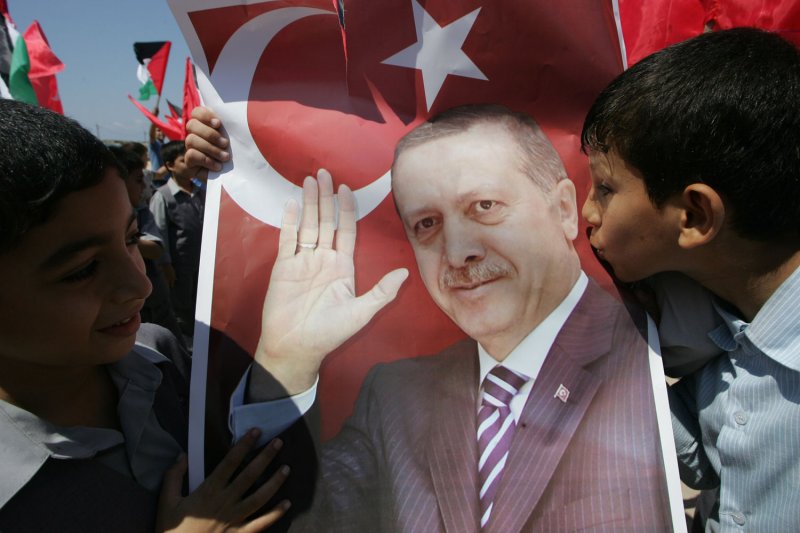Palestinian students hold up a picture of Turkish Prime Minister Recep Tayyip Erdogan and the Turkish and Palestinian flags during rally beckoning him to visit the Gaza at the port in Gaza City on September 13, 2011. Erdogan is currently visiting neighboring Egypt where he will attend the Arab League meeting to show his support as Palestinians seek support for a UN membership bid later this month. UPI/Ismael Mohamad |
License Photo
ANKARA, Turkey, Sept. 30 (UPI) -- Turkey is building its political and military profile as a regional power while contributing to EU moves to promote mediation for peace and humanitarian assistance in the region's multiple crises, from Libya, Syria to the Palestinian territories.
As the West and European Union in particular ponder their role in a reforming Egypt, Turkey has already accomplished a high-powered dash to Cairo, secured contracts worth $1 billion and reached political accords that are seen likely to outlive the transition from the military to a democratic civilian regime.
Turkish Prime Minister Recep Tayyip Erdogan led a 268-member trade delegation to Cairo in the midst of a tense standoff between the generals and the politicians and walked away with wide-ranging economic and political accords.
Erdogan was a peace mission nominally on behalf of Europe and NATO, which has seen its stock rise after the largely successful installation of a transitional government in Libya, even as the uncertain future of deposed leader Moammar Gadhafi looms on the horizon.
Turkey was the colonial power in the vast expanse that includes Egypt, Syria and the Palestinian territories right up to the early part of the 20th century. Ankara commanded respect in Gadhafi's Libya without subscribing to his politics. Despite frequent rows over payments for multimillion-dollar contracts, Ankara was able to "handle" the maverick former leader without cozying up with him.
Turkey's current diplomatic rise is a complex outcome of Erdogan's measured brinkmanship, an ongoing quarrel with Israel that raised Turkey's standing among the Arabs and the EU's dependence on Turkey's unrivaled diplomatic contacts in the Middle East and North Africa region.
"He is polling as the most popular politician, by far, in virtually every country of the Middle East, and for the revolutionary generation who turned to the Middle East's only Muslim democracy for inspiration, he is a conquering hero," The Globe and Mail newspaper in Toronto said of Erdogan in a dispatch from London.
Syndicated columnist Patrick Seale described Turkey's rise as part of the emergence of the region's alternative "heavyweights" including Saudi Arabia. At the heart of the problem, Seale said, was growing anger in the region over lack of progress in a resolution of the Arab-Israeli problems.
Seale called it "in effect a rebellion against American and Israeli hegemony as spectacular as the Arab Spring itself. The message these regional powers are conveying is that the Palestine question can no longer be neglected."
Turkey, until recently a close military and political partner of Israel, broke ranks after an Israeli attack on a humanitarian flotilla bound for Gaza in May 2010.
The Gaza flotilla raid left nine peace activists dead and 10 of the Israeli commandos wounded, one seriously. The flotilla, organized by the Free Gaza Movement and the Turkish Foundation for Human Rights and Freedoms and Humanitarian Relief, was carrying humanitarian aid and construction materials to Gaza in defiance of an Israeli blockade of the Gaza Strip. Turkish-Israeli ties went downhill from that incident and in September this year Turkey downgraded relations with Israel because of its refusal to apologize over the attacks.
Turkey was the first Muslim country to recognize Israel in 1949, before Iran under the pro-Western Pahlavi monarchy.





